Brussels/Paris/Amsterdam, February 22, 2012 – European governments must say no to the dirtiest forms of unconventional oil tomorrow, and defy pressure from both the Canadian and big oil lobbies, according to Friends of the Earth Europe. Representatives from European governments will decide tomorrow on plans to keep tar sands out of Europe.
The European Commission has announced it will assign higher carbon emission values to the more climate hostile oils than to other sources of fossil fuels, with the aim of reducing the lifecycle greenhouse gas emissions of transport fuels [1]. Countries with big oil companies, such as UK, France and the Netherlands, must not give in to the Canadian and oil lobbies – who have engaged in vociferous lobby efforts to block action by the European Commission [2].
Darek Urbaniak, extractive industries campaigner for Friends of the Earth Europe said, “European governments must defy pressure from Canada, and say no to tar sands. High polluting sources of fuels, such as tar sands, must be cleaned up or kept out of Europe – they are the dirtiest source of transport fuels, and will undermine Europe’s ability to reach its climate ambitions.”
Last week, eight Nobel Peace laureates wrote to European heads of states to ask them to support the European Commission’s efforts to keep tar sands out of Europe [3]. This follows on from a letter written to President Obama which asked him to reject the proposal for the construction of the Keystone XL pipeline – bringing oil from Canadian tar sands into the US. Obama rejected the Keystone XL pipeline proposal last month.
Juliette Renaud, extractive industries campaigner for Friends of the Earth France said, “We hope that our governments follow in Obama’s steps and have the courage to say no to tar sands. If the French government votes against the Commission’s proposal tomorrow, it will be a clear sign that France prefers to favour oil companies’ interests over those of people and the planet.”
Europe’s dangerous addiction to fossil fuels, combined with the decline of conventional oil production, has led to heavy investments in dirtier and riskier forms of unconventional oil, such as tar sands and oil shale. Producing oil from tar sands results in more than three to five times the greenhouse gases emissions from conventional oil production, and leads to irreversible damage to local communities and the environment [4].
Geert Ritsema, campaign coordinator for Friends of the Earth Netherlands said, “Oil companies are getting dirtier year on year. That development must stop. It’s time for the Dutch government to look beyond the narrow financial interests of Royal Dutch Shell, and choose cleaner fuels.”
NOTES:
[1] Article 7a of the Fuel Quality Directive adopted in 2009 set a binding target to cut CO2 emissions from transport fuel production by 6% by 2020. The European Commission has adopted a proposal for greenhouse-gas (GHG) emissions values for different sources of fossil fuel as part of the fuel quality directive. It proposed a GHG emission value for oil from tar sands of 107 grams of CO2 per megajoule of energy produced. The default value for conventional crude is 87.5g CO2/mj. The Commission proposed a value of 131.3g CO2/mj for shale oil and 172g for liquefied coal.
[2] Friends of the Earth Europe’s report ‘Canada’s dirty lobby diary – Undermining the EU Fuel Quality Directive’
[3] Letter from eight Nobel Peace laureates to European heads of states on tar sands
[4] Tar sands exploitation in Canada destroys pristine boreal forest and peatlands, produces huge quantities of toxic waste, pollutes air and water, devastates local wildlife and threatens the traditional livelihoods of indigenous communities. Tar sands – Fuelling the climate crisis, undermining EU energy security and damaging development objectives






